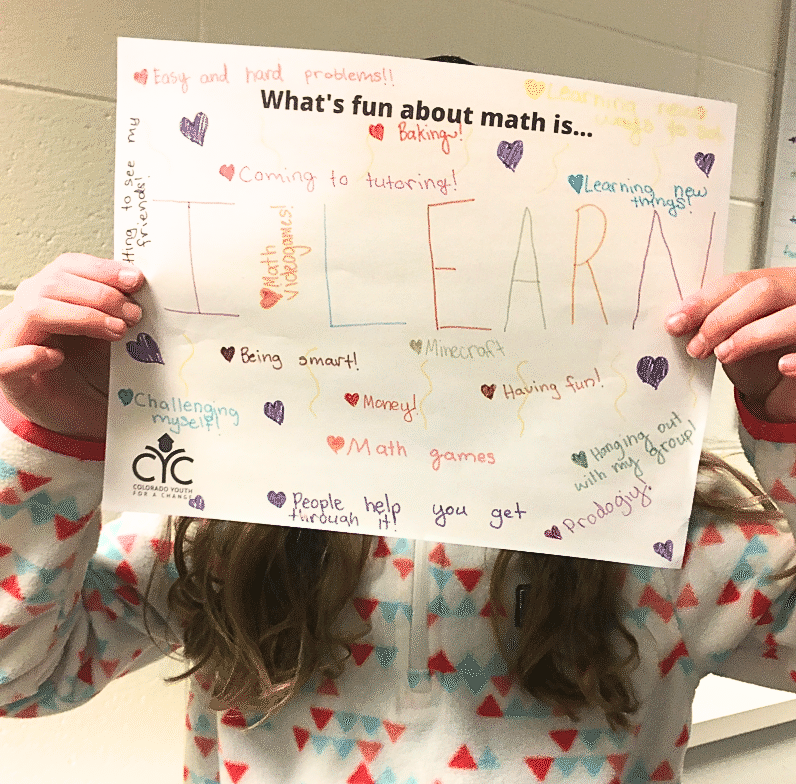By Josh Miller, CYC Math Corps Coaching Specialist If you asked a student today what…
Unpacking Our Commitment to Unlearning
by Alayna Shaw (she/her), Senior Training Manager at Colorado Youth for a Change
At Colorado Youth for a Change (CYC), we talk a lot about the importance of “unlearning”. On the surface, because we are an education-focused organization, this may seem counterintuitive. However, the fact that we are supporting students on their education journeys is exactly why the concept of unlearning is something that we are continually having conversations about with our staff and AmeriCorps members. As CYC’s Senior Training Manager, I am always looking to center the ways in which we may need to reframe, redefine and unlearn the ways in which we relate to youth.
Recently, I facilitated a training with all of our AmeriCorps members and some staff about how unlearning relates to the ways they show up as educators. We asked these folks what unlearning means to them – here are some of their responses:
- “It involves stepping out of our comfort zones and exploring what we think we know; it evokes self-reflection.” –Avel Sandoval, Corps for a Change Coordinator
- “To allow yourself to recognize that you have incorrect information or an outdated opinion about a topic and release that information so that you can accept and retain more relevant information.” –Josh Miller, Math Corps Coaching Specialist
- “To see our conditioning and be open to a new path.”—Anonymous CYC AmeriCorps Member
Our staff and AmeriCorps members are spot on. Our society conditions people to believe certain things about why students struggle in school that are often incorrect. We all hold deep-rooted biases, and we must spend intentional time to unlearn these. These biases exist due to the ways in which our education system has historically promoted incorrect/incomplete histories, the ways that only certain stories are told in the media, the ways in which our communities and schools are more racially segregated than they have ever been, etc.
When we recognize the ways in which we all hold biases and begin to unlearn these, it also makes it easier to begin to unlearn and question the ways in which we have been conditioned to think about everything. For example, what is success, really? We dug into this during our last training and asked our AmeriCorps members to share out how they would define success:
- “Students coming in and saying hi just because”
- “When teachers tell me that my students are comfortable sharing answers in class and participating”
- “Hearing students changing their mindset about mistakes and how mistakes help them learn”
- “Instilling a lifelong curiosity for learning”
- “Students passing classes they’ve never passed before”
- “Students feeling more confident in their identity”
“[To unlearn is] to allow yourself to recognize that you have incorrect information or an outdated opinion about a topic and release that information so that you can accept and retain more relevant information.”
Josh Miller, Math Corps Coaching Specialist
By unlearning what we have often been taught as the only measures of success (i.e. grades, test scores, attendance), we can spend more time celebrating our students in other ways. Also, when our staff and AmeriCorps members practice unlearning while supporting students, they are often addressing harmful myths that our society has pushed on us as well. Some examples of these are:
The myth of girls being bad at math: this is a pervasive and damaging stereotype that has serious consequences for girls and women. It leads to lower self-confidence and self-efficacy in math, reduced participation in advanced math courses, and a lower likelihood of pursuing careers in math-related fields.
The myth of students not doing well in school because they are lazy: students may face a range of challenges, such as financial difficulties, learning disabilities, mental health issues, and systemic barriers like racism and discrimination. These challenges can make it much harder for students to focus on their studies, attend school regularly, and access the resources and support they need to excel academically. Additionally, this myth places the blame solely on students, rather than addressing the larger systemic issues that contribute to educational disparities.
The myth of going to college as the only “successful” path after high school: College is a great option for some people, but it’s not the only way to be successful after high school. There are lots of other options, like vocational training, starting your own business, or getting a job right away. We should respect and value all the different paths people take to find success, not just college.
Our AmeriCorps members and staff play an integral role in supporting students to unlearn harmful myths such as these. Our goal is to always build up students’ sense of belonging, self-worth and confidence in their abilities in school, regardless of the type of support we are providing (i.e. math, reading, attendance, etc.) Through our commitment to unlearning, we aim to create a more just and equitable world for all. Systemic transformation starts with us.

